For a lot of people who menstruate, the worst case scenario is starting their period unexpectedly when they don't have their chosen menstrual hygiene product on hand. But for many people, access to things like pads, tampons, and menstrual cups — and even running water — is limited by their financial circumstances. Here's how to support the fight for free menstrual products — because there are many people who can't afford them.
In the U.S., menstruating people can spend thousands of dollars on menstrual products throughout their lifetime, if they're able to afford them. A box of tampons or a package of pads can cost $5 to $7, and even if you buy the off-brand or Dollar Store version, in most states in the U.S., you're still subject to tax. Yeah — there's a luxury tax on tampons, pads, and other menstrual hygiene products. Luxury taxes are placed on items that are seen as being "non-essential," which is an interesting take considering that anyone who menstruates has probably been told throughout their life that doing something about it is non negotiable if they want to engage with society in an acceptable manner while they're menstruating. While there are a few states leading the charge on eliminating the tax in the U.S., in most places, you still have to pay it.
That's assuming you can afford the products at all: as Congresswoman Grace Meng of New York City is attempting to point out, there are a lot of people who can't even afford to get tampons or pads in the first place. In an interview with People, Meng explained her motivation for introducing a bill that would provide the products for free, or at reduced cost, nationwide:
We’ve heard stories about girls in New York City who are too embarrassed or couldn’t afford these products. Some of them have used a rag; some would just skip school for a few days. And that’s just heartbreaking for me. Whether it’s young girls we heard about in our own city, to hearing stories about women in homeless shelters or prisons where they can’t afford their own products, and it really compelled me to work on this issue. I felt like there wasn’t enough attention drawn on it nationwide, and I just wanted to do my part.
Meng's bill — the Menstrual Equity for All Act of 2017 (H.R. 972) — would allow for the following, according to the official press release:
Allow individuals to buy menstrual hygiene products with money they contribute to their flexible spending accounts.
Provide a refundable tax credit to low-income individuals who regularly use menstrual hygiene products.
Allow grant funds from the Emergency Food and Shelter Grant Program, which can be used by homeless assistance providers for essential household items, to be used for menstrual hygiene products.
Require each state to provide menstrual hygiene products to female inmates and detainees, at no cost and on demand, as a condition of receiving funds from the Edward Byrne Memorial Justice Assistance Grant Program.
Direct the Secretary of Labor to require employers with 100 or more employees to provide menstrual hygiene products to their employees free of charge.
How You Can Help
If you're not in the state of New York, or even in a state that's considering legislation like H.R. 972, there are plenty of things you can do to help improve menstrual equality where you live, and it starts with having conversations.
Write To Your State Leaders
You can start by writing to your congressional leaders and share Meng's bill as an example of steps you wish they would take in support of access. You can also find out if your state taxes menstrual hygiene products and inform your state representatives that this practice is unjustified.
Donate
In many communities throughout the U.S., places like churches, homeless shelters, and schools often accept donations of menstrual hygiene products. If you can afford it, buy a few boxes of tampons, pads, or menstrual cups and donate them. Cups can be especially useful because they're reusable, and even though they cost a little more money up front, someone would be able to make use of it for quite a while, meaning they wouldn't have to consistently seek out donations of tampons or pads.
Host A Drive
If you don't know of any donation places in your community, start one yourself! The Purse Project is just one example of how you can gather up supplies that people might need — whether it be menstrual hygiene products, Midol, deodorant or toothpaste —which you can then take to your local women's shelter, church group, or school.
Whether you're sharing Meng's mission, talking to your local representatives, or collecting items to donate, the issue of menstrual equality is one that isn't going to go away any time soon without all of us doing our part.
